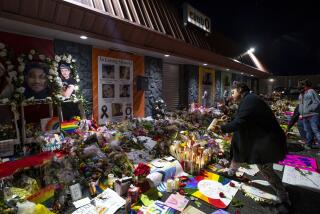THE WORLD - News from Aug. 9, 2009
- Share via
ALGIERS — All through the 1990s, when Islamic militants waged a ferocious war on the Algerian state and night life died in the city that once called itself “the Paris of Africa,” the Hanani bar and restaurant stayed open. It was “an act of resistance,” says owner Achour Ait Oussaid.
Yet today, at a time when the bloodshed has ebbed, local authorities have shuttered the hole-in-the-wall bar. “This same state has done what the Islamists never managed to do,” Ait Oussaid said, standing amid abandoned tables and empty shelves gathering dust.
At least 40 bars, restaurants and nightclubs have been closed in the last year around Algiers alone, according to local media. The government insists that the closures are strictly a matter of safety and hygiene, but suspicion is widespread that Muslim conservative pressure is to blame.
Ait Oussaid, a Muslim like almost all of Algeria’s 32 million people, contends that officials caved in to a petition circulated in his seaside neighborhood of La Perouse demanding that the Muslim prohibition against alcohol be enforced.
Many see this as one of a series of measures the government is taking in Algiers and other cities to soothe Muslim sensitivities and isolate the militants who still carry out bombings and assassinations.
The North African country has a history of tolerance and secular-leaning government, but its night life has gone through ups and downs.
When it was a French colony it boasted countless classy nightclubs and restaurants. The fun went on in the early years of independence in the 1960s, lost its flair when doctrinaire socialists ran the country, made an exuberant comeback, and then was devastated by the so-called “Black Decade” of Islamic violence and government countermeasures that left up to 200,000 dead.
The fighting erupted in 1992 when the army canceled elections that Islamic candidates were expected to win. In the ensuing years, bars, nightclubs and anything else the militants deemed Western could be targeted.
Ait Oussaid says he defied death threats to keep Hanani open. “For me, it was an act of resistance, a way to defend the Algerian state,” he said.
Youcef Kerdache, a construction entrepreneur who still drops by Hanani for old times’ sake, calls the bar a victim of “the ostentatious Islamization of Algerian society.”
Mohammed Kebir, Algiers’ regional governor, declined to comment for this report, but speaking to the French-language Liberte newspaper, he said safety regulations are the only consideration, not “religion or other pressures.”
Still, other signs point to increasing enforcement of a stricter, more visible version of Islam. Several workers were prosecuted last fall for smoking in public during the Muslim fasting month of Ramadan. Groups of Algerian Muslims have recently been put on trial for converting to Christianity.
Censorship of sexual content on national TV has become stricter, and although women aren’t officially obligated to cover their heads, students at provincial universities complain of being pressured to wear head scarves.
While the affluent elite can unwind at Algiers’ costly private clubs or international hotels, the closures appear to be hitting lower-income neighborhoods hardest.
In Boumerdes province, Gov. Brahim Merad has pledged not to approve a single liquor license. “Even better: I won’t miss a single opportunity to close the existing establishments,” the French-language El Watan newspaper quoted him as saying in June.
The “national reconciliation” put forward by President Abdelaziz Bouteflika in 2005 is widely credited with ending the worst civil strife. But Rachid Tlemcani, a political science professor at Algiers University, says: “We’re witnessing the slow growth and triumph of Islamism through society.”
Conservatives, he charged, “are nibbling at Algerian values, and authorities are following suit.”
--
Associated Press writer Aomar Ouali contributed to this report.
More to Read
Sign up for Essential California
The most important California stories and recommendations in your inbox every morning.
You may occasionally receive promotional content from the Los Angeles Times.













